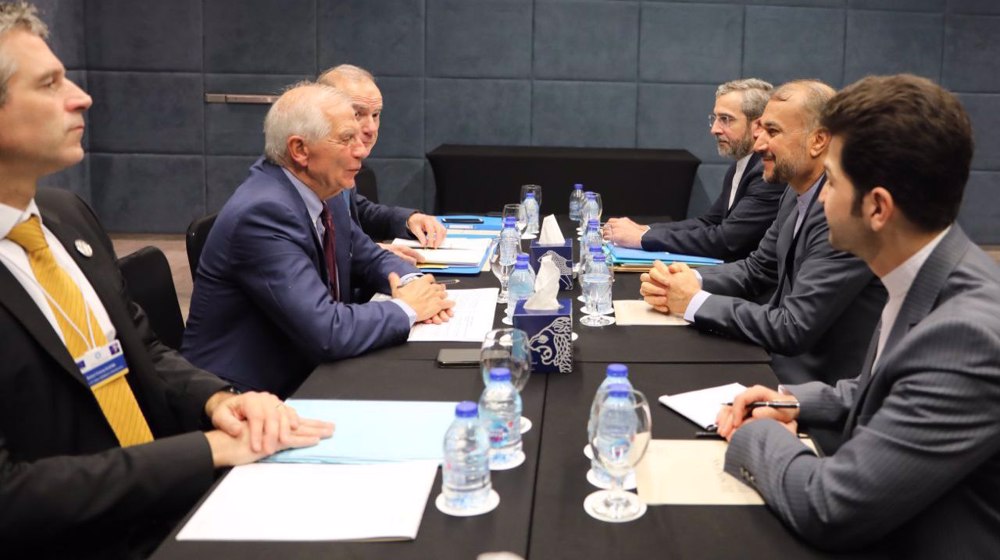EU Determined to Advance JCPOA Revival Talks

EghtesadOnline: The European Union foreign policy chief reiterated the bloc’s will to advance and conclude talks on the revival of the 2015 nuclear deal, known as the Joint Comprehensive Plan of Action.
Josep Borrell made the remarks in a meeting with Iranian Foreign Minister Hossein Amir-Abdollahian on the sidelines of the Baghdad II conference in Amman, Jordan, on Tuesday, ISNA reported.
The meeting was also attended by the Iranian and EU top nuclear negotiators Ali Baqeri Kani and Enrique Mora.
The JCPOA promised sanctions relief to Tehran in return to curbs on its nuclear program, but the United States pulled out in 2018 and reimposed tough sanctions that prompted Iran to row back on its commitments in response.
Talks began in early 2021 in Vienna, Austria, to work out how both sides could resume compliance, but have been stalled for months over final differences.
Amir-Abdollahian expressed Iran’s readiness to conclude the Vienna talks on the basis of the draft that was drawn up after months of hard and intense negotiations.
He called on the other sides to avoid politicization, adopt a “constructive and realistic” approach and make the required political decisions to close a deal.
While Iran blames the US for blocking the talks by refusing to entertain Iran’s legitimate demands, Americans accuse Tehran of making extraneous requests.
Given the unfortunate experience of US unfaithfulness, Iran wants assurances that Washington would not violate the deal again under a new government.
It also demands the closure of investigations by the International Atomic Energy Agency into uranium particles allegedly found at undeclared sites in Iran, arguing that the issue is based on fabricated data made up to be used as a means of pressure against the country.
Along this line, an IAEA technical team travelled to Tehran on Sunday following an invitation by Iran to discuss the outstanding safeguards issues.
Separate Issue
The two diplomats also discussed other issues on their agenda, including certain European countries’ positions about Iran’s domestic developments over the past months.
Borrell explained Europe’s stance toward the Islamic Republic, stressing that the JCPOA and nuclear talks are separate from other issues on the two sides’ agenda.
Iranian cities have seen unrest following the death of a young girl in police custody in September, which later developed into violent clashes between rioters and security forces, leading to the death of around 200 people, according to Iranian sources.
Tehran blames the West for provoking violence to destabilize the country in pursuit of its political goals.
European countries, along with other Western states, have taken a harsh stance, imposing a series of sanctions on Iranian individuals and organizations on human rights charges.
Amir-Abdollahian condemned Western countries’ approach in supporting trouble-makers and introducing illegal sanctions against the Islamic Republic on the “invalid grounds” of supporting Iranian people’s human rights.
He emphasized that human rights were among the very basic principles of the Islamic Revolution.
Highlighting Western countries’ history of violating the Iranian nations’ human rights, including in complying with the US unlawful sanctions, he said that their display of false remorse about the Iranian people’s rights is “not believable”.
The two also discussed allegations about Iran’s supply of arms to Russia for its war on Ukraine.
Amir-Abdollahian underscored the Islamic Republic’s principled policy of supporting Ukraine’s territorial integrity and advocating peaceful solutions to end the war and address the crisis in the ex-soviet state.
He also expressed Iran’s readiness to clear any misunderstanding in direct contact with the Ukrainian side.
Officials in Kiev claim that Russia has targeted their country with Iranian drones.
Iran denies the delivery of the vehicles, although asserting that a small number of drones had been given to Moscow months before the onset of the war.


